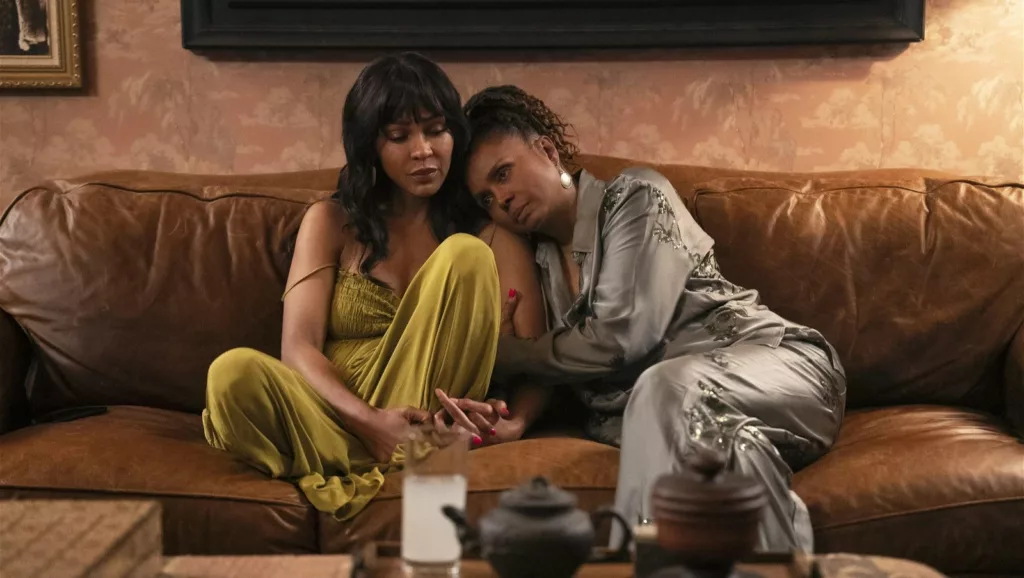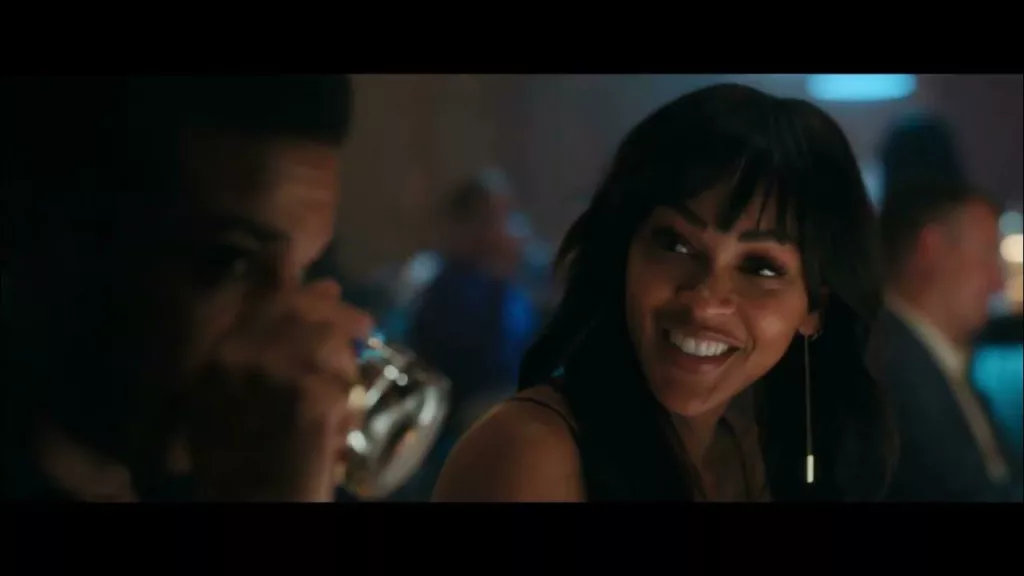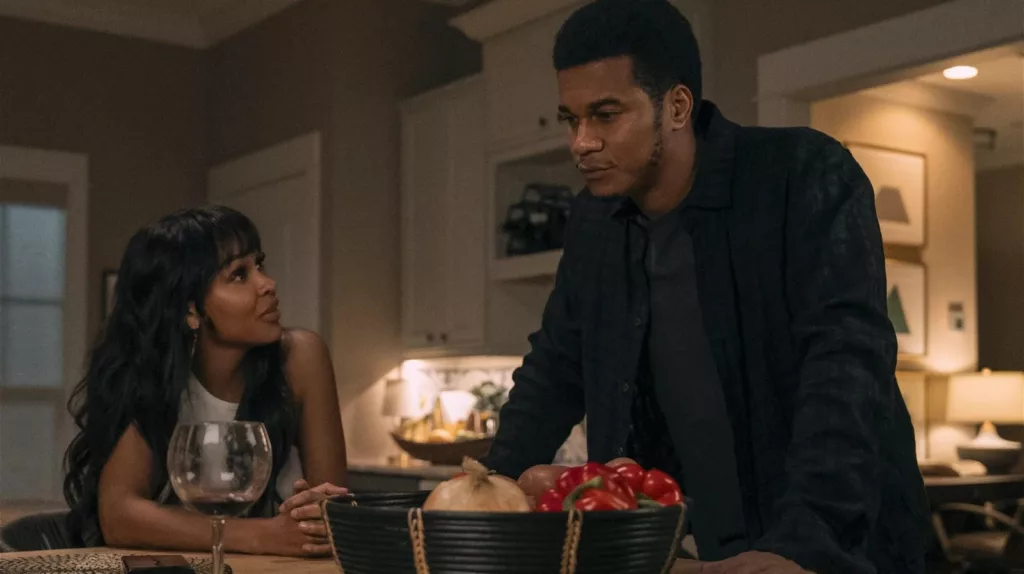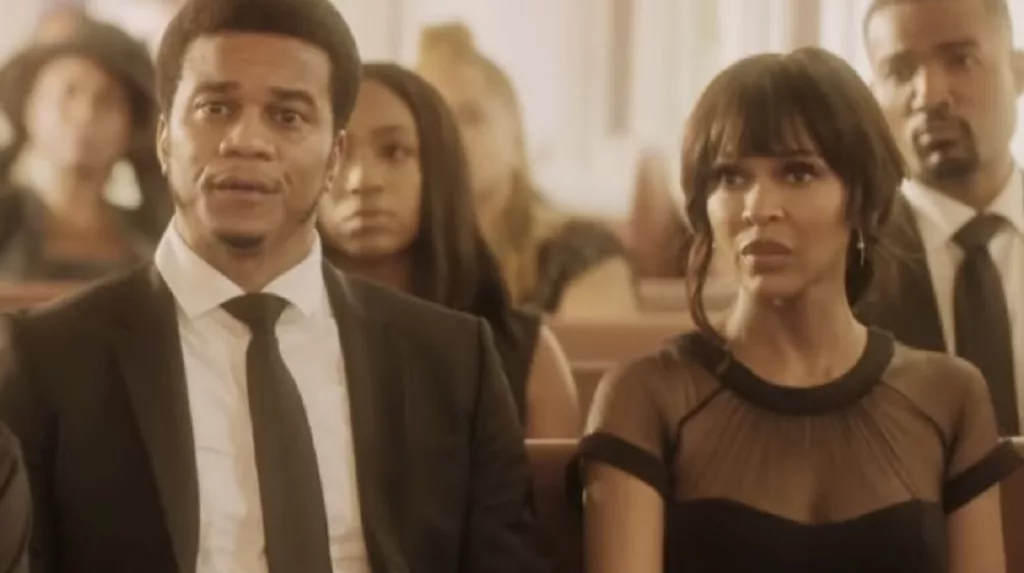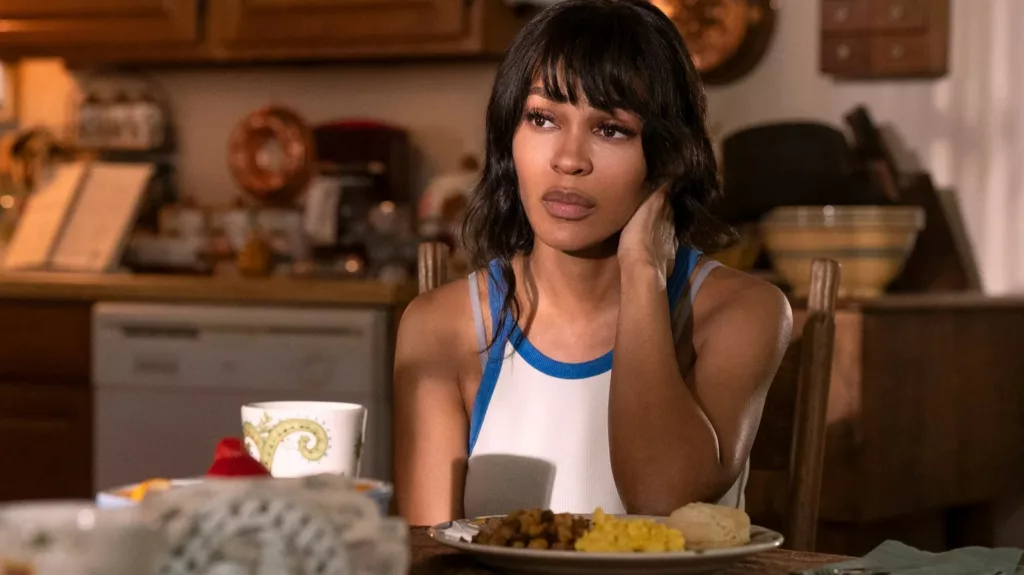Tyler Perry is no stranger to pushing boundaries with melodrama. The acclaimed director and writer has tackled controversial topics through popular films and TV shows targeting African American audiences for decades. His latest offering, Divorce in the Black, saw Perry team up with streaming giant Amazon Prime, reuniting frequent collaborators Meagan Good and Cory Hardrict in the lead roles.
The movie centers on Good’s character Ava, trapped in an abusive marriage to Hardrict’s troubled character Dallas. When Dallas abruptly asks for a divorce, Ava returns home to the supportive embrace of her religious family in rural Georgia as she picks up the pieces. From this premise rich with dramatic potential, viewers expected Perry’s signature blend of raw emotion, social commentary, and wild plot twists.
Unfortunately, Divorce in the Black largely fails to deliver. While Good and co-stars like Richard Lawson and Taylor Polidore Williams give their all, they’re let down by problematic character development and an incoherent, meandering story. The dialogue feels stilted and overlong at nearly two and a half hours. On the other hand, early scenes pack gut-punch drama and humor in true Perry style. If only he’d tightened subsequent moments with the care shown at the start, this take on divorce could have resonated far more deeply. As it stands, Divorce in the Black provides glimpses of promise within an overall disappointing package.
Under the surface
Clarence presides over the funeral of Dallas’ brother, but his eulogy goes too far in condemning the deceased. Tempers flare as Dallas’ volatile mother, Linda, demands they move the burial elsewhere. The disagreement exposes lingering tensions between the families that Ava married into.
We’re not given much insight into how Ava and Dallas’ relationship began. She now lives comfortably in Atlanta, yet he remains unsettled. When Dallas unexpectedly files for divorce over dinner one night, it comes as a shock.
Returning to her parents’ home provides Ava with stability as she navigates this change. Reverend Clarence and his wife Gene offer a safe haven, along with their guidance. Old friend Benji also reappears, willing to listen without judgment as Ava makes sense of her feelings.
Under the superficial details, deeper complexities emerge. Ava grapples with her identity now that she’s single again after so many years. Letting go of expectations carved by her upbringing isn’t simple. Dallas too clings to the past, unable to break free from destructive roots.
As shadows from the past resurface, Ava begins to shed light on what lies underneath the surface—in herself and in the marriage she’s leaving behind. Answers won’t be clear-cut, and the path forward remains uncharted. With support, Ava seeks her own way.
Tyler Perry misses opportunities in character development
The characters in Tyler Perry’s Divorce in the Black feel hollow and one-dimensional. We never get a real sense of what attracted Ava to Dallas in the first place or what was going through her mind during their many years of marriage. Dallas is simply a cruel and abusive man from the start, with no nuance or complexity. The film fails to take us on Ava’s journey as her relationship deteriorates, leaving the audience distant from her experience.
When Dallas abruptly asks for a divorce after their double date awkwardly ends, it’s hard to see this decision as anything other than a contrived plot device. We knew little about these characters’ histories or relationship dynamics prior to this event. The movie rushes through Ava’s transition from defending her marriage to embracing her new single life. Without meaningful insight into her struggles with low self-esteem or trauma from Dallas’ mistreatment, her empowered independence feels unearned.
More layers could have been added through friends like Rona, but she remains mostly a shoulder for Ava to cry on. Though she rightfully despises Dallas, Rona is never explored beyond this surface reaction. Likewise, potential love interest Benji is more of a prop to complicate things with Dallas than a fully realized person. He offers little about himself beyond an affection for country music and his farmer background.
With richer portraits of its main players and their motivations, Tyler Perry could have transformed Divorce in the Black into an impactful story about overcoming abuse. Unfortunately, one-dimensional caricatures like Dallas don’t shed light on real relationship dynamics or the inner lives of people experiencing trauma and recovery. The film misses a prime opportunity to explore character in a way that might have resonated more deeply.
Tyler Perry’s Direction Falters in “Divorce in the Black”
The technical aspects of Tyler Perry’s latest film often undermine the story he aims to tell. While relying heavily on familiar tropes engages loyal fans, incorporating them without nuance leaves some feeling disconnected from the start. The funeral scene opener exemplifies this: its outrageousness grabs attention but lacks subtlety to explore character.
This overuse of tropes becomes tiring. Story beats feel lifted from elsewhere, gap-filling around stock characters with thin motivation. Meagan Good’s role as Ava shows promise but feels constrained, as if sidelined from fully inhabiting this woman’s experience. Her friend Rona, played with empathy by Taylor Polidore Williams, offers a refreshingly dynamic one that wishes to see more focus.
Pacing too drags in the nearly two-and-a-half hours allotted. Tightening would bolster intensity as scenes started to blur together. The film also struggles to define its genre amid tonal shifts, lessening cohesion.
Despite solid performances from Good and others, Perry’s direction does them little favors. Technical aspects that could strengthen identification with Ava and her journey instead undermine audience investment. While loyal fans may enjoy glimpses of past works, Divorce in the Black suggests Perry has more to learn about nuanced storytelling that brings all viewers fully into the shared human experience on screen.
Insightful Exploration of Intimate Relationships
While Divorce in the Black attempts to portray Ava’s empowering journey after leaving an abusive marriage, some of its approaches feel misguided. The film strives to shed light on important issues but may end up causing unintended harm.
Dallas is cast as an unequivocally bad person whose mistreatment of Ava is conveyed through an unrealistic level of cruelty. This two-dimensional portrayal risks trivializing the complex realities of domestic abuse. Additionally, the film seems to suggest violence as the solution, as Ava resorts to physical retaliation. Scenes like this could promote an unhealthy perception that weapons ensure safety and empowerment.
Meaningful discussions occur between Ava and her loved ones. But at times, the dialog feels preachy rather than authentic. As friends seeking to help each other heal, more nuanced conversations may have resonated more genuinely. Sermons have their place, but realism is also needed to engage viewers on an issue affecting many families.
Overall, Divorce in the Black highlights important themes about empowerment, relationships, and overcoming trauma. But some of its storytelling choices feel misguided and may distract from these intentions. With more nuanced characters and grounded discussions, the film could have offered a starting point for meaningful reflection rather than passive entertainment. When tackling heavy subjects, responsibility for impacted communities is key. With room for improvement, perhaps future efforts will find a healthier balance.
Tyler Perry Divorce Drama Falls Short on Performances
While a few actors rose to the challenge, weak chemistry between leads and one-dimensional roles hampered Tyler Perry’s Divorce in the Black. Meagan Good’s nuanced work as Ava showed glimpses of a deeper story left untapped due to the superficial screenplay. Her aloof yet pained demeanor hinted at a woman wrestling with trauma and newfound freedom. Taylor Polidore Williams as Rona also brightened scenes with compassion for Ava’s plight.
Cory Hardrict took Dallas down a grim path but lacked variability. From his introduction as an abusive drunk to his vengeful ex, Dallas stayed venomous without motivation. Richard Lawson and Debbi Morgan added heart as Ava’s sage parents. During a heart-to-heart, Lawson’s declaration, “There’s no place like home,” resonated with the wisdom of experience.
Where the film fell short was in selling Ava and Dallas’ connection. Good and Hardrict shared a few natural moments to build viewers’ belief in their history. Emotions felt prescribed rather than emerging from an authentic dynamic between complex characters. Despite the game performances, a lack of chemistry undermined the drama.
The potential for richer portrayals existed. A keener eye could have crafted fuller roles to serve the story and draw out talents seen elsewhere in these skilled actors. But as crafted, uneven character development caused even fine performances to founder against a sea of melodrama. With stronger direction harnessing its performers’ abilities, Divorce in the Black may have found a stronger footing.
Reviewing the relationship
Meagan Good’s performance as Ava shows promise in exploring the complex emotions of a woman emerging from an abusive relationship. Her journey from a long-suffering wife to an empowered divorcee seeking a fresh start deserves a story with more depth and care. Despite some strong individual moments, this film ultimately fails to do justice to Ava’s character arc or fully realize its goal of portraying relationship dynamics within the black community.
The plot moves in fits and starts, shifting rapidly between scenes without laying the proper groundwork. As a result, it’s difficult to feel genuinely invested in Ava and Dallas’ marriage or the reasons for her staying as long as she did. More time spent developing the characters and their motivating factors could have made the drama feel more authentic. As it stands, the flat dialogue and melodramatic plotting do a disservice to such an important real-world topic.
A few performances manage to rise above the material, with Meagan Good, Richard Lawson, and Debbi Morgan bringing nuanced emotions to their roles. However, even talented actors can only do so much without a tightly scripted narrative to anchor their portrayals. Overall, the disjointed screenplay and choppy direction make it tough to connect with these characters on a deeper level.
Those seeking a thoughtful exploration of relationship nuances or insightful social commentary will likely come away disappointed. As a vehicle to dissect complex relationship dynamics within the black community, Divorce in the Black fails to hit its mark. With a sharper screenplay in capable hands, this subject matter contained greater promise for meaningful drama.
The Review
Tyler Perry's Divorce in the
With its uneven storytelling and thinly written characters, Divorce in the Black ultimately proves an unsatisfying viewing experience that squanders its thought-provoking premise. While some performances show glimpses of promise, only the barest glimpses of a deeper relationship drama manage to surface through the film's muddled screenplay. With a more focused exploration of its subjects' humanity, this movie could have delivered impactful cinematic discourse. As it stands, it offers little beyond a collection of melodramatic tropes.
PROS
- Strong lead performance from Meagan Good
- Talented supporting actors (Richard Lawson, Debbi Morgan)
- Attempts to address the important issues of abusive relationships and empowerment
CONS
- Unfocused and disjointed plot
- Shallow characterization that fails to elicit empathy
- Rushed and jarring direction
- Overly melodramatic and formulaic screenplay
- Wasted potential for deeper social commentary









































